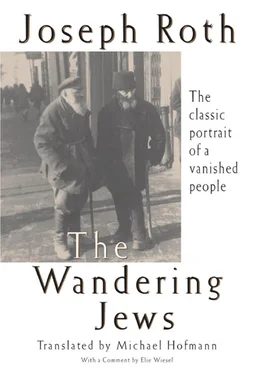Anyone deserves the West who arrives with fresh energy to break up the deadly, antiseptic boredom of its civilization, prepared to undergo the quarantine that we prescribe for immigrants. We do not realize that our whole life has become a quarantine, and that all our countries have become barracks and concentration camps, admittedly with all the modern conveniences. The immigrants — alas! — do not assimilate too slowly, as they are accused of doing, but if anything much too quickly to our sorry way of living. Yes, they go on to become diplomats and journalists, mayors and dignitaries, police inspectors and bank managers, as much pillars of the community as any of the natives. Only a very few are revolutionaries. Many are socialists from personal necessity. In the type of society that socialism would bring about, the oppression of a race is impossible. Many see anti-Semitism as an expres sion of the capitalist economy, though that isn’t what makes them socialists. They are socialists because they are oppressed.
The majority are working class or lower-middle class, without proletarian consciousness. Many are instinctively reactionary, from love of property and tradition, but also from the not unjustified apprehension that change would not necessarily improve things for the Jews. There is a historical feeling, based on plentiful experience, that the Jews will be the first victims in the event of a bloodbath.
Perhaps that’s what makes the Jewish worker so patient and calm. The Jewish intellectual may give the revolutionary movement inspiration and focus with his passionate engagement. The Eastern Jewish laborer, in his love of work, his sober cast of thought, his quiet life, is comparable to the German.
Because they do exist, Eastern Jewish workers — I assume that this still needs saying, in a country where the public prints like to harp on about “the unproductive mass of Eastern immigrants.” There are Eastern Jewish workers, Jews who don’t know how to dicker, trade, undercut, or “calculate,” who don’t deal in secondhand clothing, don’t go from house to house with their bundles, though they are often forced to take up such sad and humiliating trades because no factory will take them, because here in Western Europe there are laws (ones I’m sure are necessary) to protect native-born workers from the competition of aliens. Even if such laws didn’t exist, the prejudices of employers and also of their trade union brethren would make the Jewish worker an impossibility. In the United States he is by no means uncommon. But in Western Europe he is unheard of and his very existence denied.
Similarly denied in the West is the Jewish craftsman. The East has its share of Jewish plumbers, carpenters, cobblers, tailors, furriers, coopers, glaziers, and roofers. The notion of an Eastern Europe in which all the Jews are either wonder-rabbis or traders, and the entire Christian population is made up of peasants who live under one roof with their pigs, and noblemen who do nothing but hunt and drink, is just as ridiculous as the Eastern Jew’s dream of the humanistic West. In the East thinkers and poets* are actually more commonly met with than wonder-rabbis and traders. Apart from which, it is perfectly possible for wonder-rabbis and even traders to moon light as thinkers and poets, which is something that seems rather beyond, say, a Western European general.
The War, the Revolution in Russia, and the collapse of the Austro-Hungarian monarchy have all increased the number of Jewish immigrants to the West, who certainly haven’t come to spread the plague, the terrors of war, or the (somewhat exaggerated) horrors of the Revolution. They are even less impressed with the hospitality of the West than is the West with the arrival of these unbidden guests. (Eastern Jews received Western troops in quite a different spirit.) Finding themselves, like it or not, in the West, they had to find a way of getting by there. And they found it most readily in trade, which is not an easy profession. They gave themselves up and became traders in the West.
They gave themselves up. They lost themselves. They shed their aura of sad beauty. Instead a dust-gray layer of suffering without meaning and anxiety without tragedy settled on their stooped backs. Contempt clung to them— when previously only stones had been able to reach them. They made compromises. They changed their garb, their beards, their hair, their mode of worship, their Sabbath, their household — they themselves might still observe the traditions, but the traditions loosened themselves a little from them. They became ordinary little middle-class people. The worries of the middle classes became their worries. They paid their taxes, they received police registration forms, they registered, and they assigned themselves to a “nationality,” to a “citizenship,” which, after many chicanes, was finally “granted” to them. They used the streetcars, the elevators, all the benedictions of modern civilization. They even had a “fatherland.”
It is a provisional fatherland. National aspirations are alive in the Eastern Jew, even if he is half-assimilated to the ways and habits of the West. Zionism and nationhood are by their nature Western European ideals, even if what they aspire towards may not be. Only in the East do people live who are unconcerned with their “nationality,” in the Western European sense. They speak several languages, are themselves the product of several generations of mixed marriages, and fatherland for them is whichever country happens to conscript them. The Armenians of the Caucasus were for a long time neither Russians nor Armenians; they were Muslims living in the Caucasus, and yet they furnished the czars of Russia with their most loyal bodyguards. Nationality is a Western concept. It was an invention of Western European scholars, who ever since have struggled to explain it. The old Dual Monarchy of Austria-Hungary gave them, apparently, their best evidence of nationalism in action. In fact, if it had been at all well governed it could just as easily have provided evidence for the opposite. The incompetence of its governments furnished the evidence for a mistaken theory, founded on mistakes and given further credence by mistakes. The cradle of modern Zionism was Austria, was Vienna. It was founded by an Austrian journalist.† No one else could have founded it. The Austrian parliament was where the representatives of the various nationalities sat, engaged in fighting for national rights and freedoms that would have been perfectly unremarkable if they had been conceded. The Austrian parliament was like a battlefield for the various competing nationalisms. If the Czechs were prom ised a new school, the German community in Bohemia felt aggrieved. And if the Poles in East Galicia were given a Polish-speaking governor, then the Ruthenians felt their noses were out of joint. Every nationality within Austria-Hungary pressed its claims on the basis of its “territory.” Only the Jews (“soil” was the word used in their case) had no territory of their own. In Galicia the majority of them were neither Poles nor Ruthenian. However, anti-Semitism was to be found equally among Germans and Czechs, Poles and Ruthenians, Magyars and Romanians in Transylvania. They managed to refute the proverb that says that when two quarrel, the third is the winner. The Jews were always the third party, and they always lost. Then they pulled themselves together and came out in favor of a Jewish nation of their own. They compensated for the lack of any “soil” to call their own in Europe by aspiring to a home in Palestine. They had always lived in exile anyway. Now they became a nation in exile. They sent Jewish nationalist representatives to the Austrian parliament and began to agitate for rights and freedoms as a nation before they had been accorded even the most basic ones as humans.
Читать дальше












